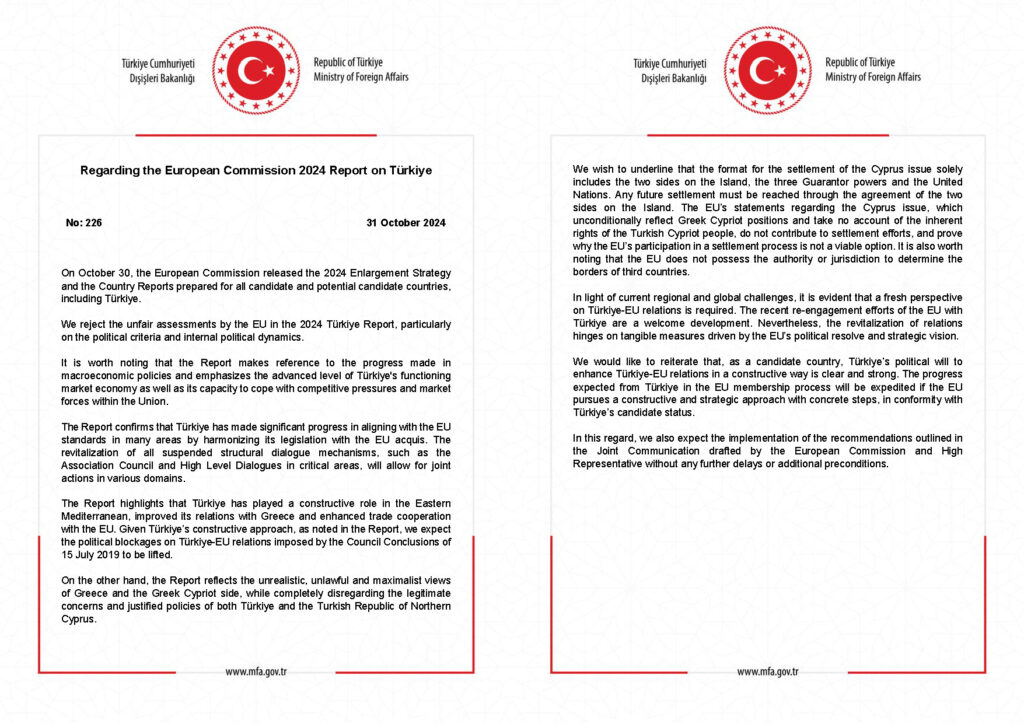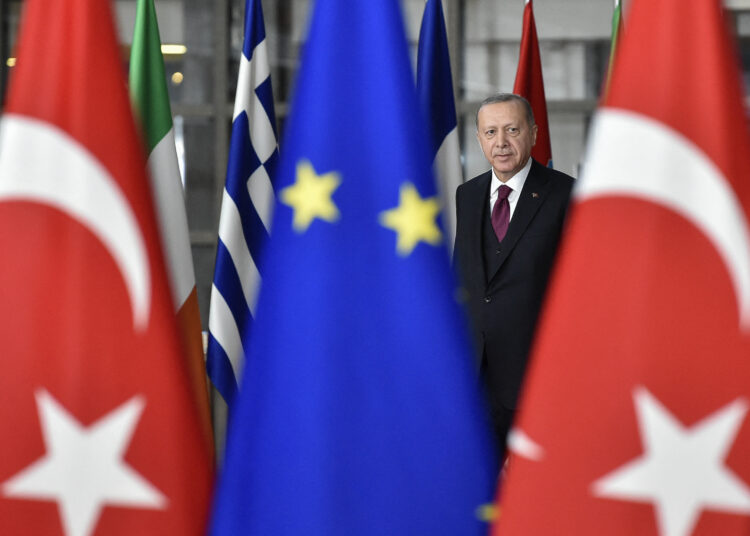Levent Kenez/Stockholm
The European Union’s 2024 report on Turkey presents criticism of the country’s foreign policy, especially for not aligning with EU interests in foreign policy. The report, prepared by the European Commission, highlights areas where Turkey’s actions are seen as conflicting with the EU’s values and policies, including its approach to Cyprus and its relationships with Hamas and Russia. Ankara finds the report unfair but chose to remain silent on the criticism regarding Hamas and Russia, unlike in previous years
According to the report, Turkey’s foreign policy decisions in recent years, particularly its stance on Russia and Hamas, raise concerns. The EU claims that Turkey’s support for Hamas and refusal to impose sanctions on Russia put it at odds with EU foreign policy. Despite EU sanctions on Russia due to the ongoing conflict in Ukraine, the report states that Turkey has continued economic and political ties with Russia, including expanded trade and energy agreements.
Ankara previously announced it would not participate in the sanctions imposed on Moscow by the United States and European Union due to its dependence on Russia for natural gas and also because Turkey is a favorite destination of millions of Russian tourists. However, an overlooked reality in the report is that many European companies are evading sanctions on Russia through Turkey. In particular, a significant number of Turkish companies continue to transport products from EU companies to Russia via land transportation.
The EU further criticizes Turkey’s response to Hamas, the Palestinian group that the EU classifies as a terrorist organization. Following Hamas’s attack on Israel in 2023, Turkey publicly supported Hamas, a position the EU report says directly opposes the EU’s stance on Middle East terrorism. These positions, the EU argues, highlight Turkey’s “360-degree” foreign policy that, according to the report, prioritizes its own strategic interests over alignment with the EU.
Turkey does not view Hamas as a terrorist organization but instead sees the group as a liberation movement. Turkish President Recep Tayyip Erdogan frequently asserts that Israel’s actions go beyond merely occupying Gaza, emphasizing that Hamas is defending not just Gaza but also Islamic lands, including Turkey.
The report also addresses Turkey’s ongoing refusal to recognize the Republic of Cyprus, an EU member state, as a serious obstacle in relations, claiming that Turkey’s proposals for the future of Cyprus disregard the desires of Cypriots and ignore international frameworks for conflict resolution. By pushing for a two-state solution, Turkey challenges both the EU and the UN’s principles on the issue. The EU highlights this as a key issue that hinders “good neighborly relations,” which are vital for Turkey’s EU accession progress.
The EU report concludes by stressing that Turkey must make more significant changes in these areas if it wants to align with EU standards and move forward in the accession process. The EU calls for Turkey to realign its foreign policy, meet EU expectations on security and cooperation and improve relations with Cyprus to support peace and stability in the eastern Mediterranean region.
In addition to foreign policy issues, the EU report points out serious concerns about Turkey’s judicial independence, human rights record and treatment of civil society organizations. The EU claims that Turkey’s judiciary lacks independence, citing government pressure on judges and prosecutors, which, according to the report, has weakened the rule of law. The EU notes that human rights violations persist, especially toward journalists, activists and political opponents prosecuted under broad anti-terror laws, which the EU urges Turkey to reform in line with European standards.
Furthermore, the report criticizes restrictions on civil society organizations in Turkey. According to the EU, these organizations face intense pressure, limited funding and frequent audits, particularly if they advocate for human rights or receive foreign funding. The EU claims that these restrictions stifle free speech and assembly, core values the EU expects of candidate countries.
 The Turkish Foreign Ministry in a written statement published on October 31 rejected the EU’s 2024 Turkey Report, calling it “unfair” in its assessment of Turkey’s political situation. Unlike previous years, the ministry did not respond with a harsh reaction. It highlighted positive acknowledgments in the report, particularly Turkey’s economic achievements and legislative alignment with EU standards. The ministry expressed satisfaction with the report’s mention of Turkey’s constructive role in the eastern Mediterranean and its improved relations with Greece, urging the EU to lift longstanding political barriers to Turkey-EU relations.
The Turkish Foreign Ministry in a written statement published on October 31 rejected the EU’s 2024 Turkey Report, calling it “unfair” in its assessment of Turkey’s political situation. Unlike previous years, the ministry did not respond with a harsh reaction. It highlighted positive acknowledgments in the report, particularly Turkey’s economic achievements and legislative alignment with EU standards. The ministry expressed satisfaction with the report’s mention of Turkey’s constructive role in the eastern Mediterranean and its improved relations with Greece, urging the EU to lift longstanding political barriers to Turkey-EU relations.
Notably, the ministry’s response did not address EU criticism related to Turkey’s stances on Hamas and Russia.












